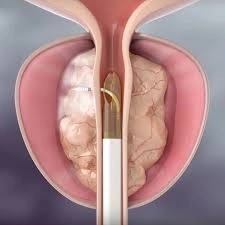
Treating Prostate and Bladder Tumors with Vaporization: Precision with Minimal Invasion
Published on: 2025-06-25 | Written by: Professor Dr. Salah Zidane, Professor of Urology
Prof. Dr. Salah Zeidan, Professor of Urology, is a leading expert in offering advanced solutions for treating prostate and bladder tumors using vaporization technology. This method is known for its high precision and minimal invasiveness, providing patients with greater safety and comfort compared to traditional surgery.
What Is Vaporization in Tumor Treatment?
Vaporization is a minimally invasive technique that uses laser or plasma energy to precisely remove affected tissue without the need for open surgery. It is primarily used for:
-
Benign prostatic hyperplasia (BPH) with bothersome urinary symptoms.
-
Superficial or early-stage bladder tumors.
According to Prof. Dr. Salah Zeidan, vaporization has proven to be a safe and effective alternative to conventional surgeries, especially for elderly patients or those with chronic conditions who are not ideal candidates for major surgery.
Benefits of Vaporization for Prostate and Bladder Tumors:
-
Minimally invasive – no open surgery required.
-
Significantly reduced bleeding risk.
-
Faster recovery and shorter hospital stay.
-
Quick return to daily activities.
-
Effective reduction in tumor size and improved urination.
Prof. Dr. Salah Zeidan highlights that this technique suits a wide range of patients, particularly those with urinary obstruction caused by benign or localized tumors.
Procedure Steps at Prof. Zeidan’s Clinic:
-
Accurate diagnosis using advanced endoscopic and imaging tools.
-
Assessment of tumor type, size, and location.
-
Use of a vaporization device powered by laser or plasma energy.
-
Precise removal of affected tissue without damaging healthy surrounding areas.
-
Post-session follow-up to monitor recovery and ensure long-term success.
Prof. Dr. Salah Zeidan adds that regular follow-up after the procedure ensures excellent outcomes and long-term stability.
Who Is a Candidate for This Treatment?
-
Patients with benign prostate enlargement causing urinary symptoms.
-
Elderly individuals who may not tolerate general anesthesia.
-
Patients with superficial bladder tumors.
-
Those with recurrent urinary obstruction with no clear underlying cause.
Post-Procedure Recommendations:
-
Take prescribed medications to reduce irritation or mild swelling.
-
Drink plenty of water to flush any residual blood.
-
Avoid strenuous physical activity for a few days.
-
Follow up regularly with Prof. Dr. Salah Zeidan as scheduled.

